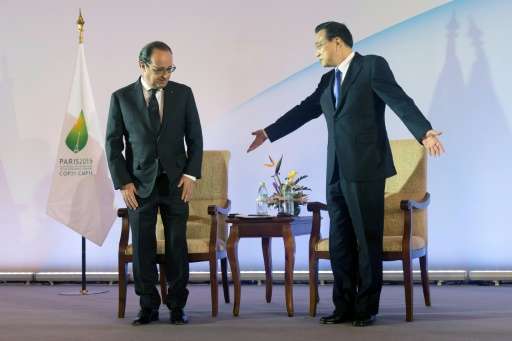China's Li: Beijing has 'duty to humanity' to boost green growth

China has used up too much energy and too many resources in its quest for growth, Premier Li Keqiang told visiting French President Francois Hollande Tuesday, adding it has a "duty to humanity" to clean itself up.
Li's comments come ahead of a UN climate summit in Paris, which will seek to unite all the world's nations in a single agreement on tackling climate change.
Hollande said in a radio interview the summit's success was "possible, not certain", with some issues still to be settled.
As the world's largest polluter, China will be a key player at the event, in the face of disputes over whether developed or developing countries should bear more of the burden for reducing emissions.
Li said more environmentally friendly development would be "obligatory" for China to "promote a restructuring of its national economy", currently experiencing its slowest growth in years.
The shift was China's "duty and a contribution to humanity" as one of the world's largest countries, he added.
China's decades-long boom, which has propelled it to global prominence, largely depended on heavy industry, real estate and infrastructure investment. But growth has slowed in recent years and now stands at its lowest since the global financial crisis, according to official figures.
"For a great many years, we consumed too much energy and resources to achieve our development, and this model has since become unsustainable," Li said, adding that China must now rely more on developing its human resources.
But he did not cite any specific measures it would take.
On Monday China and France issued a joint declaration on climate change saying that the Paris accord—intended to cap warming at two degrees Celsius (3.6 degrees Fahrenheit) over pre-Industrial Revolution levels—should include checks for compliance.
Each signatory's progress should be reviewed every five years, the statement said, to "build mutual trust and confidence and promote effective implementation".
Hollande called the declaration a "historic" step forward, and on Tuesday—the final day of his two-day trip—urged Beijing to "discuss with and convince a number of countries known to be vital" to the negotiation process.
"When China is committed, it of course commits itself but it is an example, a benchmark."
In comments to Europe1 radio during his visit to China, Hollande said there "are still a few issues that have to be settled" before the Paris talks.
"Yes, failure is still possible, but today I am confident," he said.
The November 30-December 11 UN summit will be opened by world leaders, including US President Barack Obama, China's Xi Jinping and Narendra Modi of India.
Hollande said it was encouraging that major emitters like China and the United States, as well as developing nations were all deeply engaged in the notoriously combative negotiating process.
Asked if he thought the conference would be a success, he said: "It is possible, not certain."
Among the key points still in dispute, he cited $100 billion (91 billion euros) in annual climate finance that rich nations had promised for developing countries from 2020.
Some $65 billion has been secured and another $20 billion promised, said Hollande, but "we are not yet at $100 billion".
A recent report by the Organisation for Economic Cooperation and Development said a total of $62 billion was paid in climate aid in 2014.
Rich nations say this indicates progress towards the $100 billion goal for 2020, while developing countries say the figure is not a useful measure.
China is an important member of the largest negotiating bloc, the G77 group of developing nations, which insists that rich nations must bear more responsibility for cutting emissions since they have been polluting for longer.
Developed nations point the finger, in turn, at emerging giants like China and India which burn massive amounts of fossil fuel to power their fast-growing economies and populations.
© 2015 AFP


















